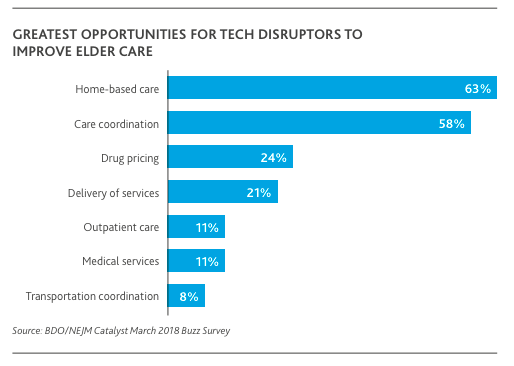Health care provider organizations are looking to make more investments in home health compared to other service lines, according to a recent report.
As the health care system pushes toward value-based care over traditional fee-for-service models, 44% of health care organizations surveyed said they’d invest most in home health care, the report, Candid Conversations on Elder Care, revealed. The report was published by the BDO Center for Healthcare Excellence & Innovation, a consulting and financial firm focused on helping health care organizations drive performance. The survey involved 487 members of the New England Journal of Medicine (NEJM) Catalyst Insights Council, including executives, clinical leaders and clinicians in health care delivery organizations.
The findings reflect the current desires of aging Americans—90% of whom wish to remain in their homes during retirement—and the greater control consumers have in directing their health care.
“Seniors want care focused on maximizing quality of life rather than number of days left,” Steven Shill, assurance partner and national leader at BDO and an author of the report, told Home Health Care News. “They want to spend their last days outside of the hospital and in the comfort of their own homes.”
Beyond home health, organizations said they would invest in palliative care (44%) and geriatric caretakers (39%), which include physicians, physician assistants, nurses, APNs, home health specialists and more.
Health care executives were also focused on new technology solutions that would help ease the increasingly tight labor markets, as well as on more traditional elder-care models like skilled nursing facilities and long-term acute care facilities (LTACs)—with added emphasis on the physician care at home model, Programs of All-Inclusive Care for the Elderly (PACE).
“Providers face new pressure from the government to curb overall health care costs, but especially in senior care—with cuts to Medicare and Medicaid and greater pushes toward Medicare Advantage happening,” Patrick Pilch, managing director and national leader at BDO and an author of the report, told HHCN.
Pilch also echoed his colleague and co-author Shill, noting that seniors increasingly want to maximize their quality of life and specifically live in their own homes.
“Home health models solve both problems: They help providers improve health outcomes and reduce hospital spending, and they empower seniors to remain in their homes for longer,” Pilch said.
Technology and recruitment
Health care executives have also been focused on the need for more medical students to enter the geriatric field to keep up with the demand for senior care, in particular home health care.
Demand for elder care is projected to continue rising across the country and in all health care settings; by 2024, health care will be the biggest employer in the U.S., according to the Bureau of Labor Statistics.
“But elder care, which is less attractive to medical students both because of the negative connotations associated with aging and often lower-paying specialties, faces stiff competition in an industry already struggling with a mass talent shortage,” the the BDO Center noted in its report.
New staffing investments will be necessary, and some organizations may end up acquiring other players in the space to find staff for specific service options, the report noted.
Home-based care was also identified as the greatest opportunity for tech disruptors to improve elder care, with 63% of those surveyed identifying the sector as ripe for technological change by 2020.

Home care has already seen a number of new providers jump into the space with the promise of disruption though a technology-heavy approach to care — and often millions in venture-backed funding to the support the innovations. However, not all these providers have been successful, and several have shifted their business model away from that of a typical private duty agency.
Many “technology disruptors” are products and services that can make it easier for seniors to age in place at home, such as internet-connected door locks, smoke alarms, thermostats, and at-home cameras for family members to monitor loved ones. Virtual assistants like Amazon’s Alexa were also identified as home improvements.
“Technologies have the potential to streamline a lot of the administrative work that can cut down the quality time caretakers and providers are able to spend with their patients, especially amid staffing shortages,” Pilch said. “Certain technologies, like robotics, could even conduct some of the manual clinical and administrative work on behalf of staff. These tools could allow caregivers to optimize the face time they have with patients and have the empathetic conversations needed to optimize their quality of life.”
Written by Amy Baxter




